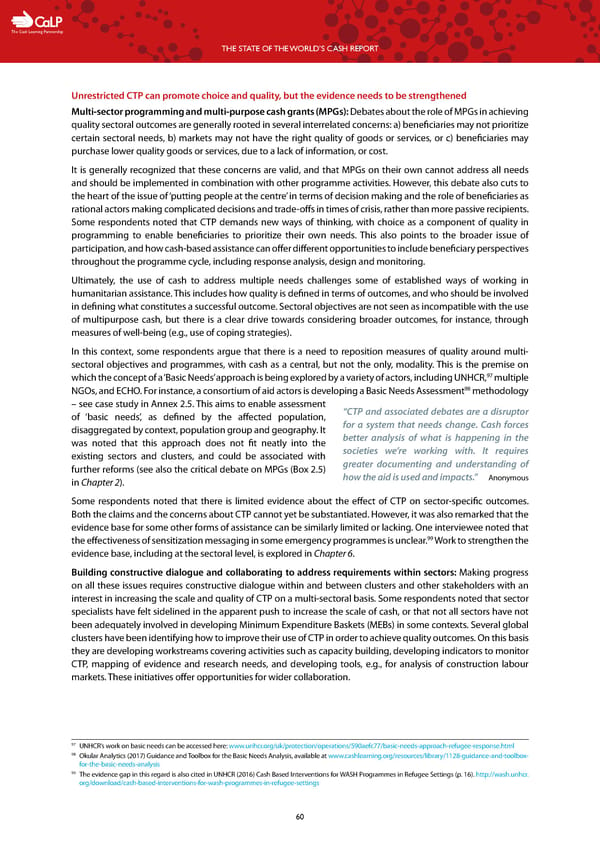C The Cash Learning Partnership THE STATE OF THE WORLD’S CASH REPORT Unrestricted CTP can promote choice and quality, but the evidence needs to be strengthened Multi-sector programming and multi-purpose cash grants (MPGs): Debates about the role of MPGs in achieving quality sectoral outcomes are generally rooted in several interrelated concerns: a) beneficiaries may not prioritize certain sectoral needs, b) markets may not have the right quality of goods or services, or c) beneficiaries may purchase lower quality goods or services, due to a lack of information, or cost. It is generally recognized that these concerns are valid, and that MPGs on their own cannot address all needs and should be implemented in combination with other programme activities. However, this debate also cuts to the heart of the issue of ‘putting people at the centre’ in terms of decision making and the role of beneficiaries as rational actors making complicated decisions and trade-offs in times of crisis, rather than more passive recipients. Some respondents noted that CTP demands new ways of thinking, with choice as a component of quality in programming to enable beneficiaries to prioritize their own needs. This also points to the broader issue of participation, and how cash-based assistance can offer different opportunities to include beneficiary perspectives throughout the programme cycle, including response analysis, design and monitoring. Ultimately, the use of cash to address multiple needs challenges some of established ways of working in humanitarian assistance. This includes how quality is defined in terms of outcomes, and who should be involved in defining what constitutes a successful outcome. Sectoral objectives are not seen as incompatible with the use of multipurpose cash, but there is a clear drive towards considering broader outcomes, for instance, through measures of well-being (e.g., use of coping strategies). In this context, some respondents argue that there is a need to reposition measures of quality around multi- sectoral objectives and programmes, with cash as a central, but not the only, modality. This is the premise on which the concept of a ‘Basic Needs’ approach is being explored by a variety of actors, including UNHCR,97 multiple 98 NGOs, and ECHO. For instance, a consortium of aid actors is developing a Basic Needs Assessment methodology – see case study in Annex 2.5. This aims to enable assessment “CTP and associated debates are a disruptor of ‘basic needs’, as defined by the affected population, for a system that needs change. Cash forces disaggregated by context, population group and geography. It better analysis of what is happening in the was noted that this approach does not fit neatly into the societies we’re working with. It requires existing sectors and clusters, and could be associated with greater documenting and understanding of further reforms (see also the critical debate on MPGs (Box 2.5) how the aid is used and impacts.” Anonymous in Chapter 2). Some respondents noted that there is limited evidence about the effect of CTP on sector-specific outcomes. Both the claims and the concerns about CTP cannot yet be substantiated. However, it was also remarked that the evidence base for some other forms of assistance can be similarly limited or lacking. One interviewee noted that 99 the effectiveness of sensitization messaging in some emergency programmes is unclear. Work to strengthen the evidence base, including at the sectoral level, is explored in Chapter 6. Building constructive dialogue and collaborating to address requirements within sectors: Making progress on all these issues requires constructive dialogue within and between clusters and other stakeholders with an interest in increasing the scale and quality of CTP on a multi-sectoral basis. Some respondents noted that sector specialists have felt sidelined in the apparent push to increase the scale of cash, or that not all sectors have not been adequately involved in developing Minimum Expenditure Baskets (MEBs) in some contexts. Several global clusters have been identifying how to improve their use of CTP in order to achieve quality outcomes. On this basis they are developing workstreams covering activities such as capacity building, developing indicators to monitor CTP, mapping of evidence and research needs, and developing tools, e.g., for analysis of construction labour markets. These initiatives offer opportunities for wider collaboration. 97 UNHCR’s work on basic needs can be accessed here: www.unhcr.org/uk/protection/operations/590aefc77/basic-needs-approach-refugee-response.html 98 Okular Analytics (2017) Guidance and Toolbox for the Basic Needs Analysis, available at www.cashlearning.org/resources/library/1128-guidance-and-toolbox- for-the-basic-needs-analysis 99 The evidence gap in this regard is also cited in UNHCR (2016) Cash Based Interventions for WASH Programmes in Refugee Settings (p. 16). http://wash.unhcr. org/download/cash-based-interventions-for-wash-programmes-in-refugee-settings 60
 The State of the World's Cash | Full Report Page 61 Page 63
The State of the World's Cash | Full Report Page 61 Page 63